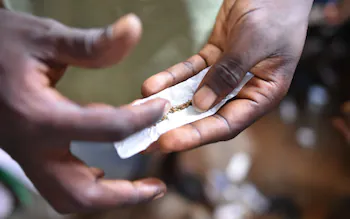…Terrifying synthetic drug linked to international trafficking networks causing devastation
By Prince Ahenkorah
A deadly synthetic drug, known as kush, is unleashing chaos across West Africa, with Sierra Leone at the heart of the crisis, according to a new report by the Global Initiative Against Transnational Organized Crime (GI-TOC) and the Clingendael Institute.
The report disclosed that the lethal drug first surfaced in Sierra Leone in 2022, rapidly spreading to Liberia, Guinea, the Gambia, Guinea-Bissau, Senegal, and beyond, resulting in a staggering number of fatalities and straining public health resources.
As of April 2024, the impact of kush, containing potent nitazenes and synthetic cannabinoids, had become so severe that the presidents of Sierra Leone and Liberia declared national emergencies over widespread drug use, marking an unprecedented response to the crisis.
Despite the rampant speculation surrounding the deadly substance, crucial questions persist: What exactly is kush? Where does it originate from? Who is behind its production and distribution? And what measures can be taken to mitigate the harm posed by this destructive drug?
The report revealed that more than 50% of tested kush samples were found to contain nitazenes, making them some of the most perilous synthetic opioids in circulation, even surpassing the potency of fentanyl.
Lucia Bird Ruiz Benitez de Lugo, director of GI-TOC’s West Africa Observatory, emphasized the urgency of the situation, stating, “These are some of the most addictive and deadly substances on the market today. We’ve heard countless myths about kush, but this report presents concrete evidence of the grave realities.”
Kush is entering West Africa through maritime routes, postal services, and air travel originating from China, the Netherlands, and potentially the United Kingdom, though specifics regarding the exported components remain unclear, implicating all three countries in the unfolding public health catastrophe.
The report detailed that the kush trade has transitioned from a tightly controlled market to a decentralized network involving local producers, intermediaries dubbed “locks”, importers, and street-level vendors, with some networks infiltrating governmental institutions, complicating enforcement efforts further.
Dr. Kars de Bruijne of the Clingendael Institute underscored the broader ramifications: “Kush represents a significant shift in West Africa’s drug landscape. The region is experiencing an influx of lethal synthetic drugs amid fragile healthcare systems and a mostly youthful population, a recipe for prolonged disaster.”
Urgent action is imperative, involving evidence-based responses through enhanced monitoring, early warning mechanisms, and sharing cross-border intelligence. Disrupting the supply chain at the source in China, the Netherlands, and the UK, and fortifying border controls at critical entry points like ports and airports are crucial steps.
Moreover, damage control efforts should focus on public awareness campaigns, expanded access to treatment and rehabilitation services, and distribution of opioid overdose reversal medications.
The Global Initiative’s Resilience Fund is actively supporting local community groups combatting the kush epidemic, with both organizations emphasizing the indispensable need for international cooperation.
Lucia Bird Ruiz Benitez de Lugo issued a stark warning, “If we fail to act swiftly, we risk transforming West Africa into a hotbed of synthetic drug dependency, with dire consequences for future generations.”


